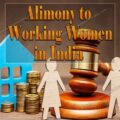
Introduction
The term ‘maintenance’ is defined as an amount payable by the husband to his wife who is unable to maintain herself either during the subsistence of marriage or upon separation or divorce. The terms ‘maintenance’ and ‘alimony’ have been used interchangeably, the term alimony means an allowance or amount which a court orders the husband to pay to the wife for her sustenance. The husband must maintain his wife and this obligation arises in marriage. Such obligations are imposed on him by operation of law.
In India, majorly five communities are identified including Hindus, Muslims, Christians, Jews, and Parsi. These communities have their laws derived from customs/traditions and laws. The law on maintenance and alimony varies from one community to another. For instance, under the Hindu Marriage Act, 1955, both the wife and the husband are legally entitled to claim maintenance but under the Special Marriage Act, 1954, only the wife can claim permanent alimony and maintenance.
Maintenance under various statutory enactments
According to Section 18(1) of the Hindu Adoptions and Maintenance Act 1956, the wife can claim maintenance and it is her legal right. Further, Section 18(2) of the said Act provides that a Hindu wife shall be entitled to live separately from her husband without forfeiting her claim to maintenance if he has any other wife living. The right to claim maintenance is also provided under Section 125 of the Code of Criminal Procedure (CrPC). A wife can also claim maintenance under the Protection of Women against Domestic Violence Act, 2005.
Factors to determine the amount of maintenance/ alimony
Husband’s income and status: The court decides the amount of maintenance or alimony that is to be paid by the husband to his wife based on his status and position, income, assets, and lifestyle. Husband’s income and financial status play very important factors while deciding a justified amount to be awarded as alimony/maintenance.
Reasonable needs of the wife: The wife’s need is not limited to food and to keep her alive, other conditions are also taken into account such as a child living with the mother, the necessities of the child, etc. The court also considers the qualification of the wife, whether she is capable to earn, etc.
Sunil Sachdeva v. Rashmi and Another, CRM-M-5732 of 2017 (O&M): Case Analysis
The High Court of Punjab and Haryana observed in a case that a wife can file a plea for maintenance u/s 125 of the Criminal Procedure Code (hereinafter referred to as the “CrPC”) even if she has already received an alimony from her husband. The Court clarified that there is no bar to seek maintenance from husband if the wife has already received a lump sum amount in the form of an alimony. She can seek maintenance if she is not able to maintain self or her children.
In 1983 the couple got married. In 1993, i.e. after ten years of their marriage they started living separately, due to fight between the two. In 1993, the couple entered into a written compromise and the husband deposited Rs.3 lac for his wife and two children as an alimony settlement regarding all the claims against the maintenance.
The wife filed an application under Section 125 of the CrPC for maintenance in 2007, which was eventually ruled in her favour in 2016 by the Additional Sessions Judge, wherein the Judge granted maintenance to the wife of Rs.15,000 per month.
That the husband being aggrieved by the decision of the Sessions Judge filed a petition under Section 482 of the CrPC to quash the judgment of the Additional Sessions Judge for granting maintenance to the wife.
The contentions of the husband was that the wife and children has already got alimony and a lump sum amount of Rs. 3 lacs previously. He further contented that it was a misuse of the process of law; as the issue of maintenance between the parties was already sorted through a written compromise which was complied with by the petitioner.
It was submitted by the wife that her earnings were very low and she drew only Rs. 17,000 until her retirement in 2018, and that it was not possible for her to provide for expenses including accommodation, electricity, water and conveyance, additionally, since she was burdened with the expenses of her two children – both being college students.
The matter was heard by Justice Amarjot Bhatti, the Punjab and Haryana High Court Judge, and the court held that the plea under Section 125 of the CrPC was maintainable. The order of the High Court reads that “It cannot be disputed that it was not possible for a lady and her two children to survive in a meagre amount of Rs. 3 lacs … it is not possible to survive in a meagre salary of Rs.17,000 and to bear the responsibility of her two children who were going in professional colleges. She was to look-after their daily expenditure, food, clothing, transportation, medical expenditure as and when required and other social obligations. Therefore, she was justified in filing the petition under Section 125 CrPC.”
The High Court found no justification to interfere with the order of the Additional Sessions Judge, and confirmed the maintenance of Rs. 15,000 per month to the wife.
The Court determines various factors while granting maintenance or alimony to a wife, the prime factors are the husband’s status and his income. Whereas the court also takes into consideration whether the wife is educated and capable to earn, if so, then it decides the alimony/ maintenance according to the same.
However, in the cases where the earning capacity of the wife is low and she has dependency or responsibility of her children then the Court considers such factors. In the instant case, the court has clarified that there is no bar in seeking maintenance even if a lump sum amount in form of alimony has already been received by the wife.





